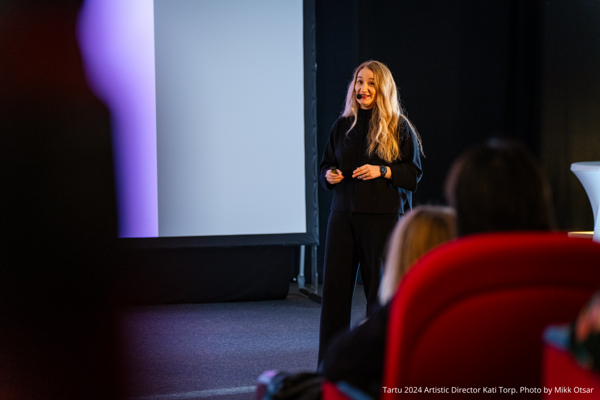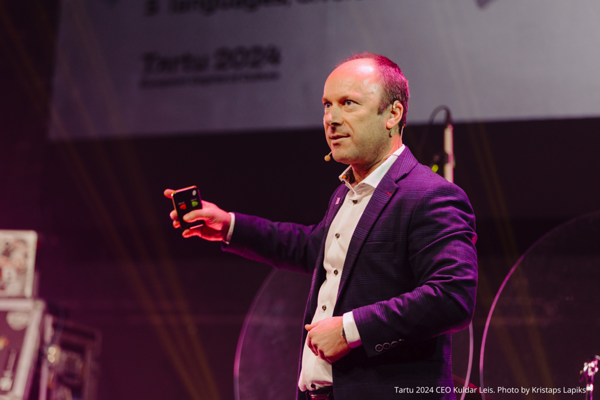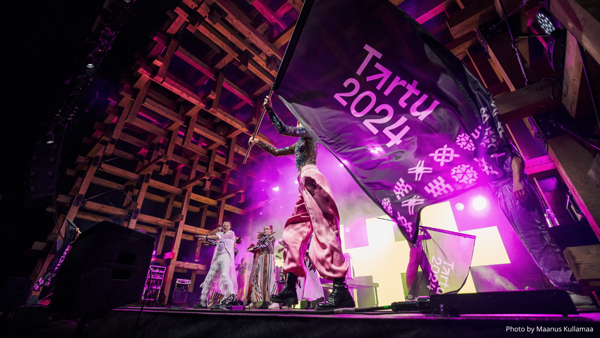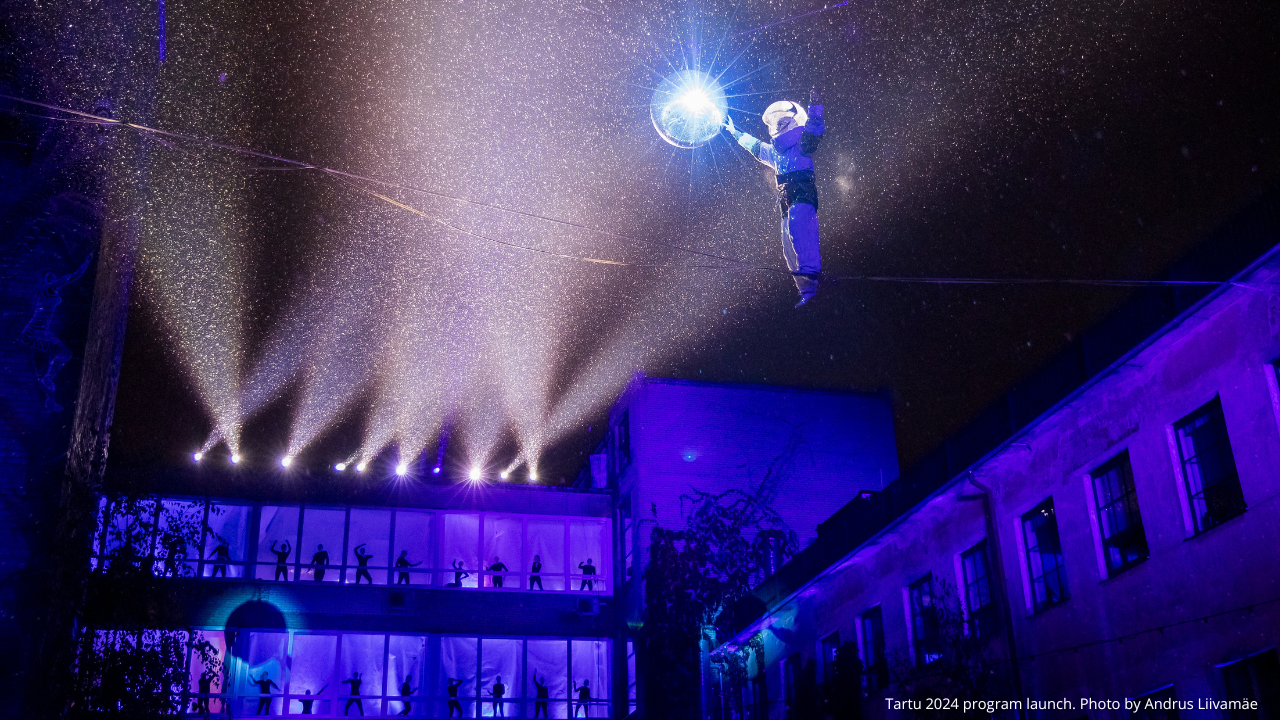
Arts of Survival: How Entrepreneurs Make It in Culture and Artists Become Executives
Culture and business can seem as two juxtaposing worlds: one driven by burning artistic passion, the other by cold hard cash. Yet rarely are these stereotypical views true and within the European Capital of Culture the two worlds are colliding. Kuldar Leis and Kati Torp from Tartu 2024 Foundation share their vision of how art and business come together in the Tartu 2024 European Capital of Culture title year as well as some program highlights for business-minded audiences.
The article was written by Kaidi-Lisa Kivisalu from Tartu 2024 Foundation.
It is also an initiative that in its essence brings together diverse groups of people. Be they in the audience of an event, part of the organizing team of a project, or even working in the Tartu 2024 Foundation. In the latter, you will meet an unexpected dynamic managerial duo: the experienced businessman turned culture organization CEO Kuldar Leis and the contemporary art curator, now an artistic director Kati Torp responsible for a program with more than 1000 events.
Culture and business can seem as two juxtaposing worlds: one driven by burning artistic passion, the other by cold hard cash. Yet rarely are these stereotypical views true and within the European Capital of Culture the two worlds are colliding.
“I like variety and experiencing new exciting things,” said the CEO, “It was a once in a lifetime opportunity, the largest joint endeavor that has ever been done in Southern Estonia. The team seemed great as well. These two components made the offer irresistible.”
Similarly, the extraordinary offer to do something unique and work with diverse artistic fields was attractive for Torp. “Simply put, I was offered the role. But to be more philosophical, you have to step into a leadership role, it cannot be given,” explained Torp. She maintains that culture must be managed. “There is no culture without resource management. It needs essentially the same touch as any other field.”
Leis echoes the sentiment that management, in its essence, is the same in business and culture. “The skill of making different people, be they heads of local governments or cultural managers, work for the same goal, applies to both sectors. Moreover, flexibility and learning how to come out of an economic crisis is handy.”
The two boast impressive credentials from their previous lines of work. Prior to joining the team, Kuldar Leis founded and managed various businesses ranging from food to railways. Kati Torp, on the other hand, made waves as a curator in the Kumu Art Museum, where she collaborated with famed fashion designer Rick Owens and rapper Tommy Cash. Furthermore, she curated the Estonian Pavilion at the Venice Biennale in 2017. Both, therefore, bring unique skills and experiences that help them survive in their new positions.
“There is an inherent contradiction,” said Leis. “Business is obviously more geared towards profit. It is essential, otherwise you will not survive.” Torp agrees: “Culture is not often profit-driven, you operate based on different logic.”
But this chasm is changing over time. According to the CEO, more entrepreneurs are understanding that they and their team need to relax and gain inspiration from outside working hours and the culture sector provides that. Mental health is a hot button topic due to high rates of burnout especially among leadership.
Interestingly, Torp sees that there are similarities in how products and artworks are at times perceived. “You have to deliver the end result. It makes a huge difference whether the result is okay, a world changer or a complete failure. Both sectors have very few world changing achievements. Still, there are artworks, products and companies without which we cannot imagine our world.”
Nevertheless, with worldviews changing, there are things that business can learn from culture and vice versa. To start perhaps with a cliché, a keyword to take away from the arts is creativity.
“An artist and a business owner put their own skin in the game. You are what you do. As an artist you create based on your experiences. As a business owner you design and carry out your activities in the same manner,” told the Artistic Director.
On the other hand, the artists should understand that everything you do has a price tag and can be measurable. “You need to prioritize according to this, and I feel like this is done much better in the private sector. There you cannot allow aimless action,” said Torp.
“Business owners can do a lot here, because in the end, those who grasp the opportunity to collaborate with or be a part of the European Capital of Culture will benefit the most,” he said. Estonians are often too modest and “sell” themselves too little. But foreign guests enjoy Southern Estonia and all those who offer experiences should promote their services boldly.
With this expected rush of foreign and local visitors, one wonders if the infrastructure in the region can handle the influx of people. Here Kuldar Leis sees a great opportunity for those with an entrepreneurial spirit.
In addition to existing accommodation, Southern Estonians can offer their rooms to visitors through the Tartu 2024 home accommodation platform, which is similar to the Rally Estonia initiative. “During the rally and the Metallica concert we were able to temporarily create a lot of new places for accommodation and the entire region benefited from this,” said Leis.
Yet this does not mean that everything is perfect. More investments in infrastructure are needed. "It is very difficult to bring international superstars here. It is not because we do not want them or could not find the resources to make it happen. We simply do not have suitable venues to host their tour stops. Even Tallinn lacks suitable places. You need infrastructure if you wish to make large-scale international cooperation happen," stressed Torp.
This is one of the reasons why many await the opening of Tartu downtown cultural centre (SÜKU), as it will create more space for exhibitions and concerts in the town.
European Capital of Culture belongs to everyone: to the culture lovers and the startuppers. Soon, all can enjoy the grand opening of the European Capital of Culture year in Tartu on January 26, 2024.
2) Räpina Good Home Days – a festival for passionate green thumbs and tinkerers, including Estonian timber construction heritage week, master competition for log house builders and international gardening competition Horty Challenge.
3) Tartu World University – a series of community academies, in which active communities from South Estonia as well as the world's top scientists and cultural figures inspire each other and improve the world.
4) Stand Up for Your Mind – a project setting up mental health cafés, starting amateur improv comedy groups on mental health and organizing stand-up performances, where professionals, as well as local people, will be sharing their mental health stories on stage.
5) Ryoji Ikeda’s solo exhibition – Ikeda will create two new works especially for the Estonian National Museum: an audiovisual installation based on the scientific data of the Institute of Genomics, University of Tartu, and a sound installation created in collaboration with the Estonian Philharmonic Chamber Choir.
6) Wild Bits – an outdoor exhibition that takes place in Southern Estonia, near Otepää at the art and technology farm Maajaam – both in the farmlands and in the surrounding nature.
7) Tartu International Literary Festival Prima Vista: Futures Better and Worse – At the festival, writers, artists, academics, and culture enthusiasts from different countries take the stage to map out and interpret the societal fears and hopes related to the future in the most expansive and diverse way.
Tartu 2024 is one of the co-organizers of sTARTUp Day 2024. Don't miss their stage program track dedicated to Arts of Survival on Day 1 of sTARTUp Day on January 25. The grand opening of the European Capital of Culture year in Tartu will unfold on January 26, 2024.
2024 is gearing up to be an extraordinary year in Tartu and Southern Estonia. Not only will the approaching European Capital of Culture year be a great celebration that draws visitors from Estonia and abroad, it is an opportunity to lay the groundwork for long-term change. This is the time for cooperation, co-creation and growth.
It is also an initiative that in its essence brings together diverse groups of people. Be they in the audience of an event, part of the organizing team of a project, or even working in the Tartu 2024 Foundation. In the latter, you will meet an unexpected dynamic managerial duo: the experienced businessman turned culture organization CEO Kuldar Leis and the contemporary art curator, now an artistic director Kati Torp responsible for a program with more than 1000 events.
Culture and business can seem as two juxtaposing worlds: one driven by burning artistic passion, the other by cold hard cash. Yet rarely are these stereotypical views true and within the European Capital of Culture the two worlds are colliding.
Setting the scene
So, how does an entrepreneur make their way to culture and a curator and art historian becomes an executive? The road for some may be straightforward, for Leis and Torp serendipity was at play, as both were unexpectedly offered the role.“I like variety and experiencing new exciting things,” said the CEO, “It was a once in a lifetime opportunity, the largest joint endeavor that has ever been done in Southern Estonia. The team seemed great as well. These two components made the offer irresistible.”
Similarly, the extraordinary offer to do something unique and work with diverse artistic fields was attractive for Torp. “Simply put, I was offered the role. But to be more philosophical, you have to step into a leadership role, it cannot be given,” explained Torp. She maintains that culture must be managed. “There is no culture without resource management. It needs essentially the same touch as any other field.”
Leis echoes the sentiment that management, in its essence, is the same in business and culture. “The skill of making different people, be they heads of local governments or cultural managers, work for the same goal, applies to both sectors. Moreover, flexibility and learning how to come out of an economic crisis is handy.”
The two boast impressive credentials from their previous lines of work. Prior to joining the team, Kuldar Leis founded and managed various businesses ranging from food to railways. Kati Torp, on the other hand, made waves as a curator in the Kumu Art Museum, where she collaborated with famed fashion designer Rick Owens and rapper Tommy Cash. Furthermore, she curated the Estonian Pavilion at the Venice Biennale in 2017. Both, therefore, bring unique skills and experiences that help them survive in their new positions.
Two Worlds Colliding
If one were to believe stereotypes then business and culture are two vastly different worlds. Yet is this true? Although both managers recognize differences, they also see where the sectors share similar approaches.“There is an inherent contradiction,” said Leis. “Business is obviously more geared towards profit. It is essential, otherwise you will not survive.” Torp agrees: “Culture is not often profit-driven, you operate based on different logic.”
But this chasm is changing over time. According to the CEO, more entrepreneurs are understanding that they and their team need to relax and gain inspiration from outside working hours and the culture sector provides that. Mental health is a hot button topic due to high rates of burnout especially among leadership.
Interestingly, Torp sees that there are similarities in how products and artworks are at times perceived. “You have to deliver the end result. It makes a huge difference whether the result is okay, a world changer or a complete failure. Both sectors have very few world changing achievements. Still, there are artworks, products and companies without which we cannot imagine our world.”
Nevertheless, with worldviews changing, there are things that business can learn from culture and vice versa. To start perhaps with a cliché, a keyword to take away from the arts is creativity.
“Business and culture are both geared towards innovation: seeing something that others have not. This certainly applies to the startup world. You need to be the first or be much better than your predecessors,” explained Torp. In her eyes it is the same in culture that to reach the news threshold you need to be distinctive.
“An artist and a business owner put their own skin in the game. You are what you do. As an artist you create based on your experiences. As a business owner you design and carry out your activities in the same manner,” told the Artistic Director.
On the other hand, the artists should understand that everything you do has a price tag and can be measurable. “You need to prioritize according to this, and I feel like this is done much better in the private sector. There you cannot allow aimless action,” said Torp.
What's in it for me?
One of the main talking points for the Tartu 2024 Foundation is that previous successful European Capitals of Culture have earned 4-5 euros for every euro spent. The head of the foundation maintains that this is also estimated for Tartu and Southern Estonia, even though you cannot measure it to the last cent.“Business owners can do a lot here, because in the end, those who grasp the opportunity to collaborate with or be a part of the European Capital of Culture will benefit the most,” he said. Estonians are often too modest and “sell” themselves too little. But foreign guests enjoy Southern Estonia and all those who offer experiences should promote their services boldly.
With this expected rush of foreign and local visitors, one wonders if the infrastructure in the region can handle the influx of people. Here Kuldar Leis sees a great opportunity for those with an entrepreneurial spirit.
In addition to existing accommodation, Southern Estonians can offer their rooms to visitors through the Tartu 2024 home accommodation platform, which is similar to the Rally Estonia initiative. “During the rally and the Metallica concert we were able to temporarily create a lot of new places for accommodation and the entire region benefited from this,” said Leis.
Yet this does not mean that everything is perfect. More investments in infrastructure are needed. "It is very difficult to bring international superstars here. It is not because we do not want them or could not find the resources to make it happen. We simply do not have suitable venues to host their tour stops. Even Tallinn lacks suitable places. You need infrastructure if you wish to make large-scale international cooperation happen," stressed Torp.
This is one of the reasons why many await the opening of Tartu downtown cultural centre (SÜKU), as it will create more space for exhibitions and concerts in the town.
Overall, those who capitalize on this new situation will win. The Tartu 2024 brand and marketing power is very strong and cooperation between entrepreneurs under its banner will definitely create extra value.
European Capital of Culture belongs to everyone: to the culture lovers and the startuppers. Soon, all can enjoy the grand opening of the European Capital of Culture year in Tartu on January 26, 2024.
Highlights in the European Capital of Culture Tartu 2024 program for business-minded people by Kuldar Leis and Kati Torp:
1) Business as Usual – a gripping theatre production inspired by the money laundering scandals that rocked Estonian banking.2) Räpina Good Home Days – a festival for passionate green thumbs and tinkerers, including Estonian timber construction heritage week, master competition for log house builders and international gardening competition Horty Challenge.
3) Tartu World University – a series of community academies, in which active communities from South Estonia as well as the world's top scientists and cultural figures inspire each other and improve the world.
4) Stand Up for Your Mind – a project setting up mental health cafés, starting amateur improv comedy groups on mental health and organizing stand-up performances, where professionals, as well as local people, will be sharing their mental health stories on stage.
5) Ryoji Ikeda’s solo exhibition – Ikeda will create two new works especially for the Estonian National Museum: an audiovisual installation based on the scientific data of the Institute of Genomics, University of Tartu, and a sound installation created in collaboration with the Estonian Philharmonic Chamber Choir.
6) Wild Bits – an outdoor exhibition that takes place in Southern Estonia, near Otepää at the art and technology farm Maajaam – both in the farmlands and in the surrounding nature.
7) Tartu International Literary Festival Prima Vista: Futures Better and Worse – At the festival, writers, artists, academics, and culture enthusiasts from different countries take the stage to map out and interpret the societal fears and hopes related to the future in the most expansive and diverse way.
Tartu 2024 is one of the co-organizers of sTARTUp Day 2024. Don't miss their stage program track dedicated to Arts of Survival on Day 1 of sTARTUp Day on January 25. The grand opening of the European Capital of Culture year in Tartu will unfold on January 26, 2024.
Articles you might also like:
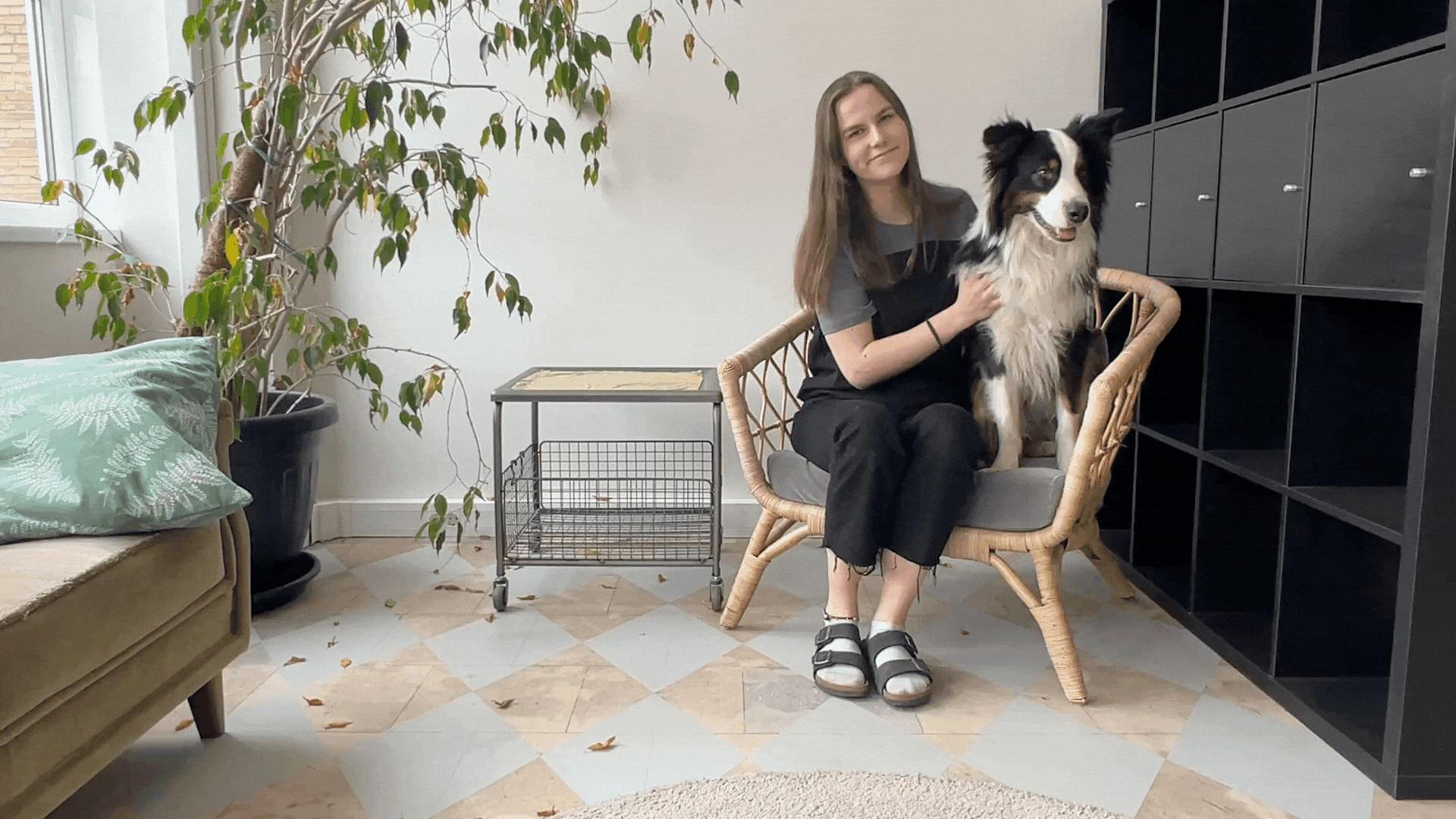
Jana Saastamoinen: "Tartu people know how to organize quality events"
25.03.2024
Jana Saastamoinen is the newest Head Organizer of sTARTUp Day! She first joined the festival marketing team in 2019 as an assistant;...
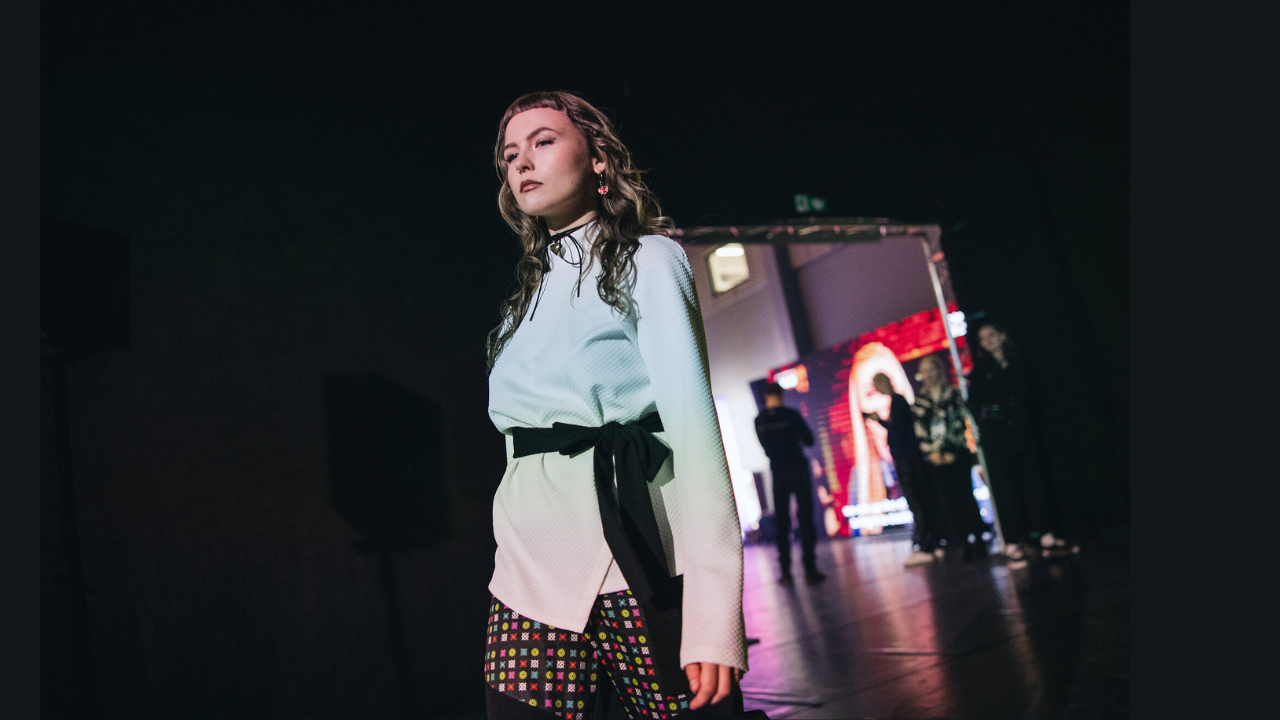
Dress for Success: Estonian Fashion and Corporate Branding
28.02.2024
Tartu Centre for Creative Industries hosted at sTARTUp Day 2024 a panel discussion titled “Dress for Success: Estonian Fashion and Corporate Branding”....
